Search Results
Showing results 1501 to 1520 of 1617

Living Bones, Strong Bones
Source Institutions
In this activity about engineering, nutrition, and physical activity, learners design and build a healthy bone model of a space explorer which is strong enough to withstand increasing amounts of weigh
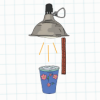
Insulation Station
Source Institutions
In this physical sciences activity, learners explore insulation. Leaners investigate how insulation can be used to slow down the conduction of heat from one side of a wall to the other.

Where Does Life Live?
Source Institutions
In this activity (on pages 22-24 of the PDF), learners match extreme enviroments with life forms they support.

Healthy Choices: A Family A-Fair
Source Institutions
Learners and their families celebrate and recognize the importance of making healthy choices every day by participating in a health fair.

Get a Leg Up
Source Institutions
In this activity, learners experiment and collect data during a simulation of the fluid shifts experienced by astronauts' bodies in microgravity.

Build a Big Wheel
Source Institutions
In this activity, learners explore how engineers have developed big wheels or Ferris wheels.
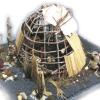
If You Lived in a Forest
Source Institutions
This activity encourages learners to focus on the natural environment of the Eastern Woodlands before the arrival of European settlers.
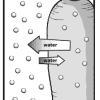
Bend a Carrot
Source Institutions
In this activity, learners investigate the process of osmosis by adding salt to a sealed bag of raw carrots and comparing it to a control.

Reusable Rockets
Source Institutions
This activity (located on page 3 of the PDF under GPS: Garbology Activity) is a full inquiry investigation into design optimization using recycled materials.

Hunting for "Measured" Treasure
Source Institutions
In this math lesson, learners rotate through various centers while comparing and ordering objects according to length.
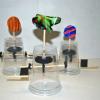
Micro Automata
Source Institutions
In this activity, learners build small animated toys that move.

Envirolopes
Source Institutions
In this outdoor activity and observation game, learners hunt for a variety of textures, colors, odors and evidence of organisms in the activity site.
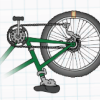
Pedal Power
Source Institutions
In this engineering activity, learners examine bicycle mechanics and gear ratios. Learners determine which gears will help them bike a set course in the shortest amount of time.
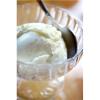
Can You Make Ice Cream in Two Minutes?
Source Institutions
In this demonstration, learners observe how liquid nitrogen both boils and freezes ingredients to make ice cream in two minutes.
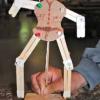
Lever Cowboy
Source Institutions
In this activity, learners build a figure that moves and "comes to life" when they pull its string.

Newton's Cradle
Source Institutions
Build your own version of the classic physics toy using simple materials.

Electric Messages: Then and Now
Source Institutions
In this activity, learners explore electronic communication, the Morse Code system, and advances all the way through text messaging. Learners build a simple circuit, send messages to one another.

In the Toilet
Source Institutions
This activity explores the basic workings of a siphon, which is the core technology that makes toilets work.

Sail Away
Source Institutions
In this activity, learners explore watercraft engineering and sailing.
Finding the Right Crater
Source Institutions
This quick demonstration (on page 11 of PDF) allows learners to understand why scientists think water ice could remain frozen in always-dark craters at the poles of the Moon.
